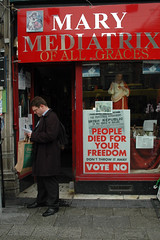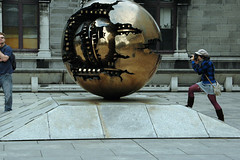Notes from the road: Dublin
We arrived at the Dublin airport at 5:15 in the morning on June 4th and made our way to the inauspiciously named "Brewery Hostel" on Thomas Street on Dublin's south side. Indeed it was located a block away from the Guinness Storehouse, but fortunately only a small handful of our fellow travelers seemed to require its powerful fumes as constant intoxicants. We were reasonably comfortable there, although the ten-bed dorm room "en suite" (=with shower and toilet in the room) was not luxurious. Breakfast was included and we had access to the kitchen, where we got in the habit of preparing our own meals. There was reliable WiFi in the large living room. We met a few Americans, a fair number of Canadians, and some Dutch travelers.
Other than the time we spent with our Buffalo-Mullingar connection, we had only brief and rare interactions with Dubliners, mainly since our first contacts are with people in service and hospitality positions, now filled by Eastern European immigrants. This staffing can make for some fairly comical scenes when Polish hospitality crews are sent out in the streets to lure tourists to their authentic Irish restaurants. Neither their costumes nor the brogue they affect are entirely persuasive: Top of mornink! You like rashers, ekks? Their fantasies undisturbed, Americans document their Irish ancestry for their Slovenian and Romanian hostesses, who must find all of this rather silly.
Our hilarity at these encounters is not shared throughout the country, however, and the influx of immigrants from the "accession states" in the EU, or more precisely the perception (common in the US as well) that immigrants are displacing native workers, is said to have been one of the factors leading to the defeat of the Lisbon treaty on Thursday. The repercussions of the Irish vote are being discussed on the radio and in kitchens and pubs; we've followed on the car radio and have asked hostel owners and guests for their thoughts. Some on the "yes" side, with that perpetual Irish anxiety over respectability, fear that Ireland looks like an unreliable partner to the rest of Europe. The opposition are ecstatic about the "courage and wisdom of the Irish voters," whose actions saved the working classes throughout Europe from reforms which would have hurt them. "Courageous and wise my arse," retorted one e-mailer to a call-in talk show; "this was a paranoid and xenophobic decision and it was a mistake."
Most on both sides are acknowledging that the pro-Lisbon establishment simply did not mount a very effective campaign. They were said to have condescended to the electorate, assuring the voters that they should simply trust their elected officials to have negotiated terms beneficial to Ireland. These politicians were vastly out-manoeuvred by the opposition. Voters were effectively motivated to fear that Irish neutrality in armed conflicts would be abolished, that Ireland would be required to take arms against the opponents of any threatened member state, that taxes would increase ("Don't let Brussels in the back door!"), that women would be conscripted, and that abortion restrictions would be lifted (echos of the gay marriage red herring -- you do know that the Democratic ticket will require gay marriage, do you not?). I was astonished to see one anti-Lisbon poster which was starkly manipulative of the country's reverence for the leaders of the Easter rising: against a background showing the 1916 proclamation of independence -- the authors of this proclamation would be executed by the British for high treason -- there was in bold letters the following grim and shameless exploitation: PEOPLE DIED FOR YOUR FREEDOM. DON'T THROW IT AWAY. VOTE NO TO LISBON.








As it happens, the Kilmainham Gaol was one of the historical sites we visited in Dublin. This is precisely the prison where the authors of the 1916 Easter rising were incarcerated and then executed. Constructed in keeping with contemporary penal theory, which emphasized segregation and surveillance, it consists of individual cells, each one facing a central hall -- the panopticon model.


We visited Trinity College as well, and saw the Book of Kells and the "long room" of the Old Library. We saw the National Gallery but missed the archaeological museum, which is supposed to be amazing. We spent a lot of time walking, and took in the Jameson distillery and O'Connell Street as well as the Temple Bar area and Phoenix Park with the Dublin Zoo.
Ghazi's first video: a baby oranguatan flirts with its mother.


Before embarking, I had re-read Homer and read Virgil for the first time with the intention of then re-reading Joyce while in Ireland, in situ, with all the desirable aids to comprehension available. I should have boned up on Shakespeare, I realize. It's slow going, but I'm enjoying it, and my inner voice is reading in the local accent, or at least my best impersonation. (Must get that CD...)
On the morning we were to leave Dublin, we had a surprise visit from Jane, a dear friend and housemate from graduate school. After a coffee together at Heuston Station, we left for the airport to pick up our rental car and head off for the country. Of that more in the next post.
Other than the time we spent with our Buffalo-Mullingar connection, we had only brief and rare interactions with Dubliners, mainly since our first contacts are with people in service and hospitality positions, now filled by Eastern European immigrants. This staffing can make for some fairly comical scenes when Polish hospitality crews are sent out in the streets to lure tourists to their authentic Irish restaurants. Neither their costumes nor the brogue they affect are entirely persuasive: Top of mornink! You like rashers, ekks? Their fantasies undisturbed, Americans document their Irish ancestry for their Slovenian and Romanian hostesses, who must find all of this rather silly.
Our hilarity at these encounters is not shared throughout the country, however, and the influx of immigrants from the "accession states" in the EU, or more precisely the perception (common in the US as well) that immigrants are displacing native workers, is said to have been one of the factors leading to the defeat of the Lisbon treaty on Thursday. The repercussions of the Irish vote are being discussed on the radio and in kitchens and pubs; we've followed on the car radio and have asked hostel owners and guests for their thoughts. Some on the "yes" side, with that perpetual Irish anxiety over respectability, fear that Ireland looks like an unreliable partner to the rest of Europe. The opposition are ecstatic about the "courage and wisdom of the Irish voters," whose actions saved the working classes throughout Europe from reforms which would have hurt them. "Courageous and wise my arse," retorted one e-mailer to a call-in talk show; "this was a paranoid and xenophobic decision and it was a mistake."
Most on both sides are acknowledging that the pro-Lisbon establishment simply did not mount a very effective campaign. They were said to have condescended to the electorate, assuring the voters that they should simply trust their elected officials to have negotiated terms beneficial to Ireland. These politicians were vastly out-manoeuvred by the opposition. Voters were effectively motivated to fear that Irish neutrality in armed conflicts would be abolished, that Ireland would be required to take arms against the opponents of any threatened member state, that taxes would increase ("Don't let Brussels in the back door!"), that women would be conscripted, and that abortion restrictions would be lifted (echos of the gay marriage red herring -- you do know that the Democratic ticket will require gay marriage, do you not?). I was astonished to see one anti-Lisbon poster which was starkly manipulative of the country's reverence for the leaders of the Easter rising: against a background showing the 1916 proclamation of independence -- the authors of this proclamation would be executed by the British for high treason -- there was in bold letters the following grim and shameless exploitation: PEOPLE DIED FOR YOUR FREEDOM. DON'T THROW IT AWAY. VOTE NO TO LISBON.








As it happens, the Kilmainham Gaol was one of the historical sites we visited in Dublin. This is precisely the prison where the authors of the 1916 Easter rising were incarcerated and then executed. Constructed in keeping with contemporary penal theory, which emphasized segregation and surveillance, it consists of individual cells, each one facing a central hall -- the panopticon model.


We visited Trinity College as well, and saw the Book of Kells and the "long room" of the Old Library. We saw the National Gallery but missed the archaeological museum, which is supposed to be amazing. We spent a lot of time walking, and took in the Jameson distillery and O'Connell Street as well as the Temple Bar area and Phoenix Park with the Dublin Zoo.
Ghazi's first video: a baby oranguatan flirts with its mother.


Before embarking, I had re-read Homer and read Virgil for the first time with the intention of then re-reading Joyce while in Ireland, in situ, with all the desirable aids to comprehension available. I should have boned up on Shakespeare, I realize. It's slow going, but I'm enjoying it, and my inner voice is reading in the local accent, or at least my best impersonation. (Must get that CD...)
On the morning we were to leave Dublin, we had a surprise visit from Jane, a dear friend and housemate from graduate school. After a coffee together at Heuston Station, we left for the airport to pick up our rental car and head off for the country. Of that more in the next post.

0 Comments:
Post a Comment
<< Home